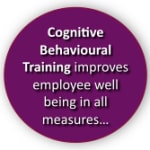Cognitive Behavioural Therapy (CBT) Seminars and Workshops for the Workplace
Best practice CBT training for awareness and self regulation skills. Bespoke flexible experiential modules to fit all training needs. Pricing is approximate and assumes a Dublin city location and your own in-house training room with AV and breakout table provision. Contact me for a quotation if outside the city and/or other needs and requests.
All of these options are flexible skills modules that can be chunked into a series of targeted sessions for specific situational stressors, and/or are an opportunity for facilitated team building and brainstorming for cultural issues and resettting.
Having trouble deciding which package to choose? Contact me at info@cbtandfeelinggood.com or 0868113031 or through my Contact Page for a free training needs assessment and a quotation. Modules are flexible and training can be designed to fit particular and specific needs and skills gaps.
Scroll down for more information…
Best Practice Awareness and Self Regulation Training
... (CBT & Feeling Good Training Programmes and Trainers are approved for the National Register of Trainers. (Reg # 903680.) In full compliance with the Qualifications (Education and Training) Act Ireland 1999.)
What is Cognitive Behavioural Training for the workplace?
Cognitive Behavioural Training (CBT) for the workplace is a structured and evidence-based approach to improving the mental well-being and performance of employees. It incorporates practical principles of cognitive behavioural therapy, to help individuals to develop cognitive and behavioural skills to enhance their well-being, cognitive functioning, performance, experience, and overall effectiveness in the workplace.
Here are some key aspects of CBT benefits for the workplace:
- Identifying and Changing Negative Thought Patterns: CBT encourages individuals to recognise and reframe negative thought patterns and beliefs that can lead to stress, anxiety, and depression. In the workplace, this might involve addressing self-doubt, imposter syndrome, public speaking anxiety, and unrealistic perfectionism and expectations that can impact job performance.
- Managing Stress: CBT techniques are used to help employees develop effective strategies for understanding and regulating and managing workplace stress. This can include body regulation exercises, task/time good habit skills, and breathing balance techniques.
- Emotional Regulation: CBT teaches individuals how to better regulate their emotions, helping them respond to workplace challenges with greater emotional intelligence – leading to better choices and better outcomes.
- Problem-Solving: CBT equips employees with ‘rational thinking’ problem-solving skills to address work-related issues more effectively. This can enhance decision-making and conflict resolution abilities.
- Communication Skills: Effective communication is crucial in the workplace. CBT can help individuals improve their interpersonal skills, assertiveness, and conflict resolution techniques.
- Goal Setting and Motivation: CBT can help employees set and achieve professional goals by addressing motivational issues and breaking down larger objectives into manageable steps.
- Self-Esteem and Confidence: CBT can enhance an individual’s self-esteem and self-confidence, which can be beneficial for career development and job satisfaction.
- Work-Life Balance: CBT can assist employees in finding a healthy work-life balance, reducing burnout and improving overall well-being.
Cognitive Behavioural Training in the workplace is typically provided through workshops, seminars, or one-on-one sessions – my models are flexible and bespoke – and can be tailored to fit your needs exactly. Contact me for a free training needs analysis – or trust me to deliver core training that applies to every human in your organisation – CBT is science, and science is magic that works. Check out my testimonials to see the very real return on investment for CBT training.
Try it out in your workplace: contact me at info@CBTandFeelingGood.com or 0868113031 for a free training needs assessment.
(CBT & Feeling Good Training Programmes and Trainers are approved for the National Register of Trainers. (Reg # 903680.) In full compliance with the Qualifications (Education and Training) Act Ireland 1999.)

“I thought this was one of the best presentations I’ve seen in a long time, Veronica was so engaging and managed a difficult subject with humour.. I’d very much recommend Veronica’s talk to everyone”
“She was brill, really engaging and made the topic memorable and entertaining”
“Veronica was inspiring and reassuring, and I would recommend her both to individuals and companies”
“A very inspiring hour which flew in, great insight to how things have changed over the years and food for thought to use on a daily basis – thank you!”
“Veronica was like a breath of fresh air, informative, engaging, funny, reassuring!! I know that I left the room feeling happier”

Veronica Walsh recently completed one to one CBT sessions with a number of our clients. These clients had reached a certain point in their lives and their recovery from addiction and were unable to move forward. This left them struggling to commit to attending anything that might help. Veronica worked with these clients where they were at and tackled their individual blockages with them. She taught them strategies to recognise and overcome similar situations if and when they should arise again. Client attendance for the 5 week Programme was 100% and all clients have since expressed an interest in continuing this work. The insight into their self-sabotaging thinking has empowered these clients beyond recognition. I think that these results speaks volumes for her work, her understanding of people and her empathy for them and her commitment to facilitate change in their lives.

“Veronica Walsh presented Mind Mapping to a staff group from three organisations and delivered an interesting and stimulating session which captured the basics of visual note taking and presentation in a half day event.Participants were engaged throughout and found the creation of relevant mind maps in a group setting a valuable way to embed the learning.”
Our staff thoroughly enjoyed Veronica Walsh’s recent CBT presentation, ‘Happiness In The Workplace.’Feedback was overwhelmingly positive.
Veronica is engaging, inspiring and compelling. A breath of fresh air, we highly recommend her for staff development.

“Veronica is a gifted trainer whose down-to-earth approach is tailored for every client. Brilliantly perceptive and generous with her time and talent, she makes a real difference to those with whom she works.”

“Veronica is an excellent and compelling advocate for CBT: her presentation content, coupled with her engaging speaking style, greatly added to the experience of our event for attendees.”

The Northside Partnership has used Veronica Walsh to deliver her Coping Skills and Feeling Good programme to our unemployed clients. The programme has been extremely well received both by the Northside Partnership and the participants. Veronica is professional in her approach and has great empathy with our clients. We definitely intend using her again to deliver this programme.”

“A huge thank you to Veronica Walsh who recently spoke at our Executive PA Forum on Visual Note-taking and Mind Mapping Technique, which went down extremely well at the event.
She also delivered a workshop on the Cognitive Science of Public Speaking – her presentation style is highly engaging, she is enthusiastic about her subject matter, and held everybody’s attention for 3 hours.
We had hugely positive feedback on both of Veronica’s presentations and I would highly recommend her for any speaking engagement or training.”
Cognitive Behavioural Training (CBT) - Coaching, Seminars, and Workshops
... Cognitive-behavioural training to change attributional style improves employee well-being, job satisfaction, productivity, and turnover - (from the Elsevier published controlled study - Proudfoot, Corr, Guest, and Dunn)
Why would you book Cognitive Behavioural Training?
The Elsevier science research study on brief cognitive behavioural therapy workshops in the workplace concluded:
“Cognitive-behavioural training to change attributional style improves employee well-being, job satisfaction, productivity, and turnover”
(‘Attributional style’ is a psychological term for how we explain the world to ourselves, our mindset)
(Click HERE to open a new window to the cited Elsevier study on the results of employee CBT)
A new foundation for management skills
Most of the top executive ‘how-to’ management books and training assume that the executive is starting from a position of rationality and good psychological health, and indeed that the staff they manage are emotionally healthy too –according to the founding father of CBT, Dr Albert Ellis, this is an ERROR.
Those books and training can have high value, but the value can only be accessed when there is a base of good psychological health and well being in the first place, and when rational thinking skills are being applied to general thinking and communications and behaviours to enable a positive and optimistic state of mind. Cognitive Behavioural training gives a great foundation to make the most out of other professional training. Check out my testimonials to see the return on investment.
(CBT & Feeling Good Training Programmes and Trainers are approved for the National Register of Trainers. (Reg # 903680.) In full compliance with the Qualifications (Education and Training) Act Ireland 1999.)
Think different. Feel different. Behave different. With Cognitive Behavioural Therapy skills…
Quick intro: I am a CBT training specialist – I design and deliver best practice psycho-educational therapy / training, coaching, seminars and workshops. My original CBT resources are used by mental health practitioners all over the world (through my internationally high ranking blog) – I provide bespoke flexible models of practical cognitive science awareness and regulation coaching and training to individuals and companies and organisations – adapting best practice evidence based psychotherapy (with liberal dashings of neuroscience and neurobiology) into fast fun and effective experiential skills training.
Contact Me at veronica@cbtandfeelinggood.com or 0868113031 to discuss a training needs assessment, or to request example session plans or to request a quotation for bespoke training for individuals or groups.
Links to Veronica Walsh in the media…
Presentation / Seminar - from...
Half Day Workshop - from...
One Day Workshop - from...
> I teach best practice proven theory and application as used in the Elsevier CBT workplace training study.
> My free CBT as self help resource blog has had over one million views, and the downloadable CBT worksheets and handouts are used by mental health professionals worldwide.
> The workshop is multi-media and includes an original resource workbook for attendees to further the learning themselves, and includes after-access to my online guided self help site.
> Benefits are reported to be immediate and ongoing.
> The training is fast, fun, and effective, and includes neurobiology / neuroscience modules.
> The workshop training also serves as a great team building and bonding exercise as it uses an experiential learning by discovery group discussion model.
Click for my CBT Downloads blog – regularly cited in the Top 10 CBT blogs in the world – used by mental health professionals internationally.
Contact Veronica Walsh at
veronica@CBTandFeelingGood.com or 0868113031 for more information.
More info links: click any icon below to open a new window to my info post site pages:





























